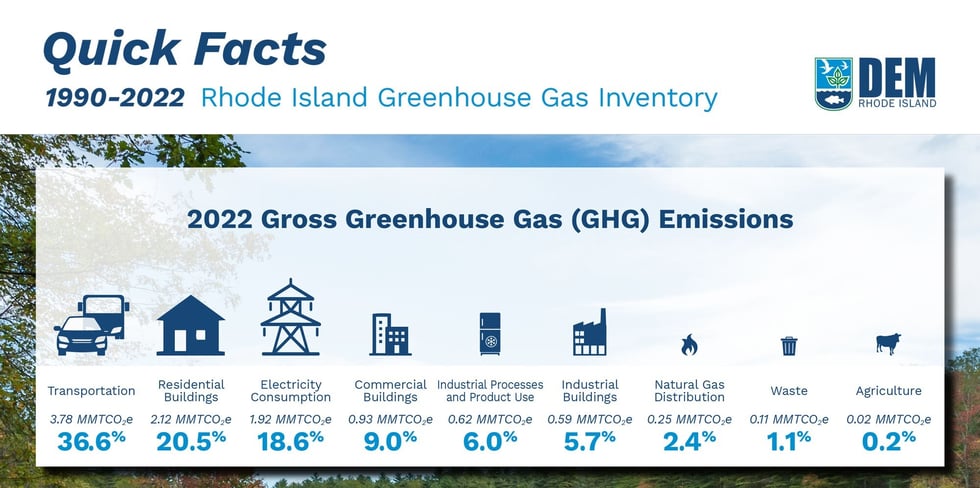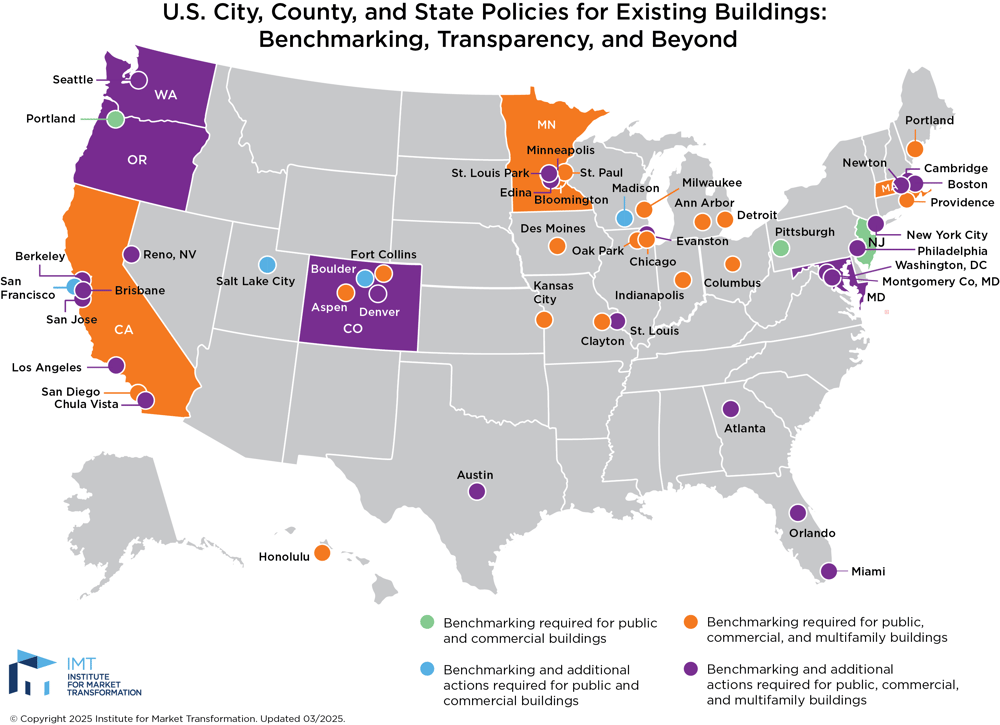Calling all Rhode Islanders! We are nearing the end of our legislative session, and we are still pushing for the Building Decarbonization Act (H5493/S91) to be voted out of committee and passed by the House and Senate. Read on to learn why this bill is critical for Rhode Island, and if you’re interested in supporting the bill, check out this blog post for more directions.
But First... The Act On Climate
In 2021, Rhode Island passed an Act on Climate, which set mandatory, enforceable emissions reduction mandates that set the tone for how Rhode Island must address the problem of climate change.
Emissions Mandates:
- 10% below 1990 levels by 2020
- 45% below 1990 levels by 2030
- 80% below 1990 levels by 2040
- Net-zero emissions by 2050
To help contextualize the state’s emissions and how close we are to reaching the Act on Climate mandates, the RI Department of Environmental Management (DEM) releases an annual Greenhouse Gas (GHG) emissions inventory, although that report has about a 2-year lag between the data and the current year.
When looking at the most recent GHG inventory, the building sector (residential, commercial, and industrial buildings) contributes over 35% of the state's total emissions, the second highest-emitting sector behind transportation. However, the building sector has no specific policy intended to drive down emissions to meet the Act on Climate. This leads to the question: What can the state do to target large buildings and reduce emissions?

The Building Decarbonization Act of 2025
The Building Decarbonization Act of 2025 is Green Energy Consumers' top legislative priority in Rhode Island this session. This bill has three sections intended to measure building energy use, reduce emissions, and build better. It would provide a structure and schedule for building owners to track and understand their energy usage, and ways to reduce emissions in line with the Act on Climate. Critically, passage of this bill would create a building sector policy intended to reduce emissions.
Section 1: Benchmarking
- Large buildings (>25,000 square feet) would be required to report their energy usage data to the state.
- Public buildings would be required to report first along with private buildings >50,000 square feet.
- Private buildings >25,000 square feet would then be required to report the next year.
Section 2: Building Performance Standards
- The Executive Climate Change Coordinating Council (EC4) would be required to develop performance standards by which large building owners must reduce emissions in line with the Act on Climate.
- BPS would be studied in the state’s Climate Action Strategy.
Section 3: Electric-Ready New Construction
- Electric-ready new construction is supportive of Rhode Island’s existing energy code.
- Building electric-ready ensures that new construction has the necessary wiring and capacity to support a future retrofit from a mixed-fuel building to all-electric.
- Electric-ready new construction can also prevent costlier retrofits in the future, if the wiring and capacity does not exist.
Importantly, the governor's fiscal year 2026 budget did include a state benchmarking and performance standards program and allocates an employee to begin that work (pg. 31). However, there are many more large buildings in the state that should be included in a benchmarking and performance standards program than just state-owned and state-operated buildings. This bill would widen the scope of buildings required to comply.
Benchmarking & Building Performance Standards Work
We know that benchmarking and building performance standards (BPS) are effective policies that can reduce emissions. Our very own capital city, Providence, has a building energy reporting ordinance which requires municipal buildings greater than 10,000 square feet, and private buildings greater than 20,000 square feet to report their emissions. In the city’s first annual report, they detailed their 100% compliance with energy reporting.
Outside of Rhode Island, eight other states have a benchmarking policy, and four states have a building performance standard. These policies have been well researched and are intended to help building owners better understand their energy usage and improve it. By benchmarking energy usage, a building owner could identify areas that could be retrofitted to efficient appliances or house renewable energy technology that can lower utility bills, and demand on our shared electric grid.

If building owners aren’t already benchmarking, starting to do so is a good way to manage a facility and understand where there are opportunities for improvement. There are many rebate and incentive programs offered in Rhode Island to help building owners make efficiency upgrades, and the upfront costs often pay for themselves via future energy savings. Energy benchmarking can also contextualize where building owners are with energy usage and where they need to go to meet decarbonization goals.
Building Decarbonization & RI’s Climate Action Strategy
The EC4 is currently in the process of developing RI’s Climate Action Strategy (CAS), an additional requirement in the Act on Climate and the document intended to help guide the state towards meeting the 2030 goal of 45% emissions reductions below 1990 levels. The Building Decarbonization Act would require BPS to be studied in that report, which is a critical way to help understand the impacts of BPSs on statewide emissions.
By studying performance standards in the CAS, building owners can better understand the timeline for emissions reductions and plan investments in energy efficiency and renewable energy along with other capital improvement projects. This would provide transparency and stability with what the state is requiring of large building owners while exploring potential options for cost mitigation through rebates or incentives.
Support This Legislation
To support the Building Decarbonization Act of 2025 (H5493/S91), you can email or call your local legislators, along with House leadership, and Governor McKee. Find detailed instructions and contact information here.
If you have additional questions about the bill, you can visit this webpage, and review the frequently asked questions, or reach out to Rhode Island Policy Advocate, Tina Munter at: Tina@GreenEnergyConsumers.org.


Comments